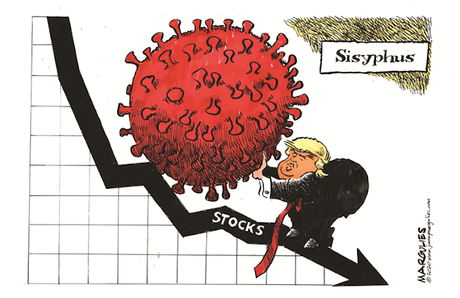 (Cartoon image is by Jimmy Margulies at jimmymargulies.com.)
(Cartoon image is by Jimmy Margulies at jimmymargulies.com.)In the face of the Coronavirus crisis, Donald Trump has made a lot of mistakes. Perhaps one of the worst is that he is more concerned about the stock market than about the health of Americans.
The economy does need some help, but Trump's latest idea (more tax cuts) is not going to be effective -- either for the economy or to curb the spread of the Coronavirus. We need more spending in all areas of public health. Congress seems to be doing that, but we'll have to see if they are spending enough.
The other thing that's needed is to protect workers (especially low wage workers who have not paid sick leave). Giving them paid sick leave will protect those workers financially, and it'll protect the public by allowing them to not be at work if they are sick.
Here's part of how the editorial board of The New York Times puts it:
The panic may be on Wall Street, but the pain is also going to be felt on Main Street. Our society is constructed to reward the rich in good times and punish the poor in bad times. A coronavirus recession would be doubly painful, as lower-income households are likely to pay a heavier toll in both health and wealth. Lower-income families are less likely to have health insurance, or jobs that provide paid leave, or jobs that can be done from the comfort of a home office. Wealthier Americans can dream of riding out the coronavirus with the help of Amazon; it is less-affluent Americans who will sort and deliver the packages. The government can help. An effective public health response necessarily requires limits on economic activity; an effective fiscal policy response can offset the damage. One clear and critical example is the need for universal paid sick leave. Approximately one-quarter of private-sector workers — about 32 million people — cannot take paid sick days. Congress can change that by mandating paid sick leave and covering the cost, for example through a one-time tax credit. Paying sick workers to stay home is good for public health and the economy: It protects the physical health of colleagues and customers, and the financial health of low-wage workers who might not be able to afford unpaid time at home. Huge spending on public health is also sensible under the circumstances. The federal government should pick up the tab for state and local spending on the crisis response — including on staffing health facilities, testing for the coronavirus and equipment to keep workers safe — and it should encourage public health officials to pull out all the stops. Limiting the spread of the virus is the best way to minimize economic damage, not to mention meet the government’s basic responsibility to prevent people from becoming seriously ill or dying. And every dollar spent on public health provides just as much of an economic boost as would spending on anything else. One item that’s not on this list, however, is a broad-based tax cut, Washington’s preferred cure for all economic ailments. Mr. Trump said Monday that his administration planned to propose a reduction in the federal payroll tax, which is paid by a broader range of workers than the income tax. But there is good reason to worry about the public-health effects of encouraging people to go out and spend more money. The government needs to focus on limiting the spread of the virus by encouraging sick leaves, quarantines and other measures that can be described as taxes on economic activity. It makes little sense to enact a countervailing tax cut. The time to stimulate the economy is after the danger is under control.

